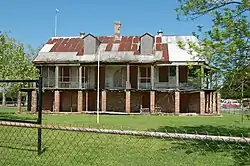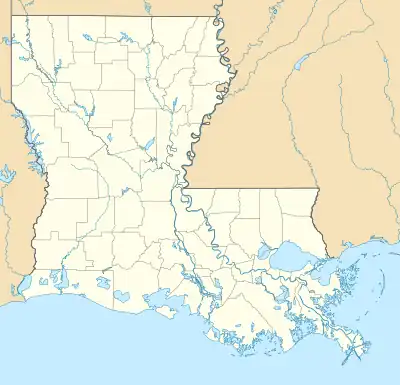Godchaux–Reserve Plantation | |
 Godchaux-Reserve Plantation House in 2012 | |
 | |
| Location | 1628 Louisiana Highway 44, Reserve, Louisiana, U.S. |
|---|---|
| Coordinates | 30°03′19″N 90°33′50″W / 30.055278°N 90.563889°W |
| Architectural style | French Creole and Federal |
| NRHP reference No. | 93001548 |
| Added to NRHP | January 21, 1994 |


Godchaux–Reserve Plantation, also known as Godchaux–Boudousquie Plantation, and the Reserve Plantation, is a former plantation, former site of a sugar refinery, and once included a historic house built in 1764, located in Reserve, St. John the Baptist Parish, Louisiana.[1]
The house is listed as a National Register of Historic Places since January 21, 1994 for the architecture.[1]
History
House
The earliest portion of the house is thought to be built in 1764 by Jean Baptiste and Marie Therese Laubel.[2] Between 1810 and 1833, it is thought that the main house was owned by unknown free people of color.[2] From 1833 to 1855, the house was owned by Antoine Boudousquie and his wife, Sophie Andry Boudousquie, and followed by a purchase by Leon Godchaux in 1869.[2]
In 1909, President William Howard Taft visited the Godchaux–Reserve House while touring Louisiana and he gave a speech at this location.[3][4]
Sugar mill and refinery
By the late 1800s, Godchaux and his family turned the plantation and the sugar refinery into the largest sugar manufacturers in the United States and one of the largest globally.[5] Godchaux had owned network of 12 sugar plantations, all located across southeast Louisiana that fed into the Godchaux Sugar Refinery.[5] For many years the Reserve plantation property held the Godchaux Sugar Refinery which was active from 1917 to 1985; and the company had once offered public tours.[6][7]
House architecture
The Godchaux–Reserve Plantation house is a colombage (or timber framed) raised building, designed in the French Creole and Federal architecture styles.[3] The core structure of the house is thought to be built in 1764 by Jean Baptiste and Marie Therese Laubel and was simply a two wooden rooms with a fireplace.[2]
The house has had four major periods of construction and has been moved at least two times.[3][8] Sometime prior to 1900, the house was moved to the Godchaux Sugar Mill.[3] On September 25, 1993, the house was moved from the former Reserve Plantation (less than one mile distance) to its location on 1628-Louisiana Highway 44 (also known as Great River Road).[3]
Four Federal architecture-style wraparound fireplace mantels featuring intricate designs and motifs were added to the home in circa. 1825 during a renovation; however, it is unclear how much of the house was renovated during this time.[3] A renovation circa. 1850 on the house added new flooring, new moldings, new roof columns, and a new roofline.[3] The walls of the building are a combination of brick and bousillage between the wooden posts.[3]
By the early 1990s, the building was in disrepair.[4] In 2013, the Godchaux-Reserve House Historical Society (GRHHS) was formed in order to restore the house.[8][2] The long-term goal of the GRHHS was to restore the building into a museum open to the public.[4]
Publications
- The Story of Godchaux's Pure Cane Sugar (1 ed.). New Orleans, LA: Godchaux Sugars, Inc. 1933. OCLC 4233358.
- Famous Recipes From Old New Orleans: Collected for You by the Makers of Godchaux's Sugars (5 ed.). New Orleans, LA: Godchaux Sugars, Inc. 1955. OCLC 1031406758.
See also
References
- 1 2 "Godchaux--Reserve Plantation House". NPGallery Asset Detail. National Park Service, U.S. Department of the Interior. Retrieved 2022-01-18.
- 1 2 3 4 5 "Personal space". The Magazine Antiques. February 1, 2018. Retrieved 2022-01-18.
- 1 2 3 4 5 6 7 8 "National Register of Historic Places Registration Form, Reserve Plantation House". United States Department of the Interior, National Park Service. December 17, 1993.
- 1 2 3 Robichaux, Brooke (2018-09-08). "Godchaux-Reserve renovation hits milestone: Oct. 16 community celebration open to public". L'Observateur. Retrieved 2022-01-20.
- 1 2 Hammer, David (2017-12-16). "Leon Godchaux: The Times-Picayune covers 175 years of New Orleans history". NOLA.com. Archived from the original on 2017-12-16. Retrieved 2022-01-20.
- ↑ B., C.; Beaty, J. K. (1950-03-05). "Spring Tours By Car and Boat Through Louisiana". The New York Times. ISSN 0362-4331. Retrieved 2022-01-20.
- ↑ Karst, James (August 9, 2015). "See Vintage Photos of Godchaux Sugar Refinery: Our Times". NOLA.com. The Times-Picayune. Retrieved 2022-01-20.
- 1 2 "Godchaux-Reserve House will celebrate progress on renovation project". NOLA.com. October 12, 2018. Retrieved 2022-01-18.

